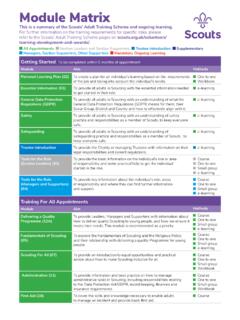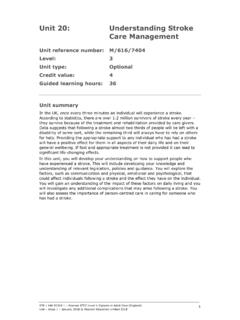Transcription of Adult’s Personal File
1 #SkillsForLife October 2020 Adult s Personal File For Managers and Supporters Adult s Personal File for Managers and Supports 2 Contents Contents 2 Letter from the Chief Scout 5 PART 1: Key Contacts for Training 6 PART 2: Introduction to Adult Training 7 PART 3: Creating Your Personal Learning Plan 13 PART 4: Module Pages 26 Personal Learning Plan (02) 27 Essential Information (01) 28 Safety 29 Safeguarding 30 Trustee Introduction 31 General Data Protection Regulations (GDPR) 32 Tools for the Role (Managers and Supporters) (04) 34 Delivering a Quality Programme (12A) 38 The Fundamentals of Scouting (05) 41 Scouting for All (07) 44 Administration (11) 46 First Aid (10)
2 48 INDEPENDENT LEARNING 50 SKILLS COURSES 59 LEADERSHIP AND MANAGEMENT TRAINING VALIDATION AREAS 61 Managing Time and Personal Skills 61 Achieving Results 63 Providing Direction 66 Working with People 68 Enabling Change 72 Using Resources 74 Safety for Managers and Supporters 77 Running Safe Activities (17) 81 International (19) 84 Facilitating (28) 88 Presenting (29) 89 Supporting Local Learning (30) 90 Adult s Personal File for Managers and Supports 3 Planning a Learning Experience (31) 92 Planning a Learning Provision (33) 93 Managing a Learning Provision (34) 94 Mentoring and Coaching (39) 95 APPENDIX 1: Useful Resources 96 APPENDIX 2: Personal Learning Plan Template 97 APPENDIX 3: Manager and Supporter Validation Record 100 APPENDIX 4: Recommended Learning for Leadership and Management Training 103 Adult s Personal File for Managers and Supports 4 Editor s note Although in some parts of the British Isles Scout Counties are known as Areas or Islands and in one case Bailiwick for ease of reading this publication simply refers to County/ Counties.
3 In Scotland there is no direct equivalent to County or Area, and Scouting is organised into Districts and Regions, each with distinct responsibilities. Some County functions are the responsibility of Scottish Regions, while others lie with Scottish Districts. The focus of responsibility is outlined in Scottish Variations from POR. The equivalent role to County Training Manager in Scotland is the Assistant Regional Commissioner (Adult Training). For ease of reading this document refers to County Training Manager, except where there is a practical difference between the two roles, in which case this is indicated.
4 The term Training Manager is used to refer to those in The Scouts who are responsible for managing training provision, including: County/Area Training Manager, Local Training Manager, Assistant Regional Commissioner (Adult Training) Scotland and Assistant District Commissioner (Adult Training) Scotland. Again, for ease of reading, all adults taking part in the Training Scheme are referred to as learners . A note on the order of modules within this document Please note the deliberate order of the modules which are listed within this document. The modules have been put into groups to assist learners and Training Advisers to identify and prioritise learning whilst still allowing flexibility based on individual learning needs.
5 We note the importance of Delivering a Quality Programme (12A) and have therefore prioritised this module above others in the Training for All Appointments group. The module numbers are indicated in brackets at the end of the title to help track the modules on Compass and match them to existing documents. Adult s Personal File for Managers and Supporters Letter from the Chief Scout Thank you for volunteering your time to Scouting. You have joined the most successful youth movement the world has ever seen, with a rich history and a bright future. Since Lord Baden-Powell founded the Scout Movement in 1907 it s gone from strength to strength, growing and developing into the global Movement we know today.
6 Scouting remains as relevant to the young people of the 21st century as we have been to those of the past. As adults in Scouting, whatever our role, we all have the responsibility of supporting young people in their Personal development, encouraging them to actively engage with their community and empowering them to make a positive contribution to society. This unique role we have in young people s lives is both a challenging and rewarding task. To support you as an adult in Scouting, The Scouts provides training that builds upon your existing skills, knowledge and experience.
7 The training you will receive is intended to give you additional skills and knowledge to ensure that you can carry out your role to the best of your ability. The Scouts also seeks to offer development opportunities for adults and training is just one means by which Personal development needs can be met. I wish you well with your training and hope that you enjoy being part of the Scout Movement. Bear Grylls Chief Scout Adult s Personal File for Managers and Supporters 6 PART 1: Key Contacts for Training Training Adviser Use this space to record the contact details for your Training Adviser, the individual responsible for supporting you through the completion of your training.
8 Name _____ Address_____ Tel no _____ Email _____ Line Manager Your line manager should also be able to support you in your training. You may find it helpful to record their details below. Name _____ Address_____ Tel no _____ Email _____ Training Manager If you have any difficulties, you can also contact your Training Manager directly at: Name _____ Address_____ Tel no _____ Email _____ The information you gather above from each member should be kept safe and only used by you to contact them for support. Scout Information Centre The Scout Information Centre is also available to help answer any questions you might have about Scouting.
9 You can contact the Scout Information Centre by telephone on 0345 300 1818 or by email, or live chat on the website. Adult s Personal File for Managers and Supporters 7 PART 2: Introduction to Adult Training About this Guide The aim of the Adult s Personal File is to introduce you to The Scouts Adult Training Scheme and to provide you with some tools and information to help you with your training. This guide only refers to the compulsory training that is relevant to those taking on appointments as Managers or Supporters. A full list of all of the modules within the Adult Training Scheme can be found in the Module Matrix, available at How does the scheme work?
10 To ensure that young people experience good quality Scouting, The Scouts requires each adult in Scouting to demonstrate a range of knowledge, skills and attitudes that are relevant to your Scouting role. The range of skills The Scouts expects of people in different roles is described in a number of modules, which together make up the Adult Training Scheme. More information about the principles of The Scouts Adult Training Scheme can be found in the Adult Training Scheme document at Learning and validation There are two key elements to the Adult Training Scheme: Learning - This is when you have the opportunity to gain or improve the knowledge and skills which you need for your role.









